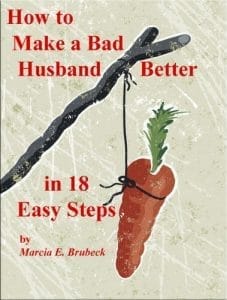
Should I Get a Divorce?
Many unhappy couples go to counselors together before calling it quits. Many of the counselors believe that their job as professionals is to save the partnership.
Dr. Phil is an example. “You know you’re ready for a divorce when you can walk out the door with no anger, frustration or hurt. Otherwise, you’ve got unfinished business,” he says. “Unless and until you look each other in the eye feeling peace, no hatred or resentment, you’re not ready to get a divorce.”
I do not agree. My decades of work with couples have taught me that a marriage can be salvaged only as long as both people are determined to overcome the obstacles. If one person throws in the towel, the other person must yield. Relationships cannot be unilateral and always call for hard work. Only the parties involved can say whether they want to soldier on together.
Ideally, true, people make peace before they part company. Therapists call this “termination work.”
Still, the problem people confront when they contemplate divorce is not generally, as most people assume, whether or not you are ready to leave the other person. Rather it’s the loss of the dream you had for your marriage.
Maybe you believed that one day the two of you would retire to Bora Bora, where you would sunset together. Now, as you prepare to split even the things that seem unsplittable, you are dismally aware that your shared dream will never come to fruition.
The breakup of a marriage, particularly one that has lasted for years, is a loss to be grieved. Pace Dr. Phil, messy feelings are always involved. Accepting them and finding peace take time.
A fair number of the people come to see me wondering whether they should seek a divorce. When I see one person in the couple, after an hour’s worth of listening, I can usually tell what he or she wants. If both come, there are many signs.
Maybe you could drive a truck through the physical space between them. Maybe she loudly declares that she’s done, while he protests. Or he remains silent throughout her recriminations.
Or she voices suspicions that he insists are unfounded. Or he lays out ironclad rules for her conduct that she finds intolerable. This last, my-way-or-the-highway scenario makes it clear to everyone that negotiation is not an option.
Sometimes one person wants a divorce and hopes for support from me in going through the ordeal. Sometimes, though, people are genuinely confused, uncertain how to proceed and needing to sort through their feelings.
If you belong to this latter group, this blog post is for you. It may also be helpful if you are wondering how healthy your marriage is.
There are different ways of taking stock of your marriage. Sharyn Soohoo, a family trial lawyer, offers a quiz that may help you scope the territory. My online inventory, The Ideal Partner Identikit, invites you to identify habits and traits that are important to you in a companion and to score different people to see how they stack up.
Still, in my experience, divorce doesn’t usually come about because of the other person’s deficits, character flaws, or bad habits. It is usually precipitated by a crisis.
Sometimes children grow up and move out. In the ensuing weeks and months, the parents realize that they have become strangers to each other. Or one party, not knowing how to have a difficult conversation, courts mayhem by seeking comfort in the arms of a third party.
Other disasters may bring matters to a head, for example, the death of a child or a bankruptcy or foreclosure. The parties may each blame themselves for the trouble and then find themselves unable to comfort each other. Over time one or both people lose hope of fixing a relationship that seems joyless.
At such moments the decision people make is often determined not by the bad stuff, which has usually been there for a while, but by other considerations. If I cut and run, they think,
What about the children?
What about our friends and our families?
What about my future?
Let’s take these concerns in order.
The children. People sometimes stay together when they would rather not because they think they should preserve the family for the sake of the kids. Occasionally someone will tell me, “My parents divorced when I was growing up, and I don’t want to put my children through that.”
There are several problems with this line of reasoning. First, divorces abound in our society, and they are sometimes better for children than the alternative. Your divorce may actually help your kids grow up resilient and healthy, especially if there was a lot of fighting when the parents lived together.
More important, though, is the matter of how children learn. Kids learn far less from what we say than they do from how we behave. Parents are their most important teachers. Dads model father, husband, and man. Moms stand for mother, wife, and woman.
When you remain in a loveless, conflicted marriage, you are showing your children how to have one. If you fast forward ten or twenty years, you may find yourself wringing your hands at the spectacle of your children enduring misery because divorce seems unthinkable.
On the other hand, if you file for divorce, you can teach your kids valuable lessons. You can show them how to grieve loss, how to manage conflict, and how to part company with a spouse respectfully and appreciatively. All are super skills for children to have in their kit!
Friends and families. The people who know and love the two of you as a couple may well have a hard time handling the breakup. Some, not knowing how to stay connected to you both, will feel the need to pick one over the other. Your families, concerned and wanting the best for you, may offer unwelcome advice and criticize your decisions.
We all value the high regard of important others in our lives. At the end of the day, though, you are left alone with your life. You will get no extra points posthumously for having pleased your father or Aunt Nellie.
You can ask other people for their love and support at this difficult time. If they bow out, well, you can remember that, like the rest of us, they are doing the best they can. That’s true even if their best isn’t exactly what you were looking for right then. In any case, you have no control.
Your future. Fears for the future are perhaps the biggest factor deterring people from making a break. The devil we know always looks better than the devil we don’t. People on the threshold of divorce ask themselves painful questions: If I leave him (or her) behind, I will be alone. What will that be like? How long will it last? Will I ever again find someone? Will divorce mean that I am unlovable?
The older you are and the longer you have been married, the larger and more frightening the risk can seem. Older men whose marriages crumbled after a decade or more often become gun shy—willing to tolerate loneliness and isolation rather than risk another relationship that might also fail. Older women, usually painfully aware of wrinkles, drooping, and weight gain, may worry that no one will find them attractive.
The bottom line: Will I die alone? Of course none of us can know for sure.
Another problem, to which women are perhaps more prone, is the fear that they cannot survive on their own. How many of you dames can use an electric drill and a toilet plunger? Can you make a budget, pay bills, and navigate tax time?
Not long ago a woman contemplating divorce confessed to me her fear that without her husband she could not get her car repaired or choose sensibly when the time came to buy a new one. And if yours were your offspring’s primary residence, how would you manage child care as a single parent? How much cooperation could you expect from your ex?
Whatever the obstacles you envision, if you choose divorce, you will find that many others have trod the path before you.
Since no one has a crystal ball, taking the plunge entails a willingness to accept some risk. You must have faith and hope and believe that, whatever happens, you will be able to cope with it. After all, you have survived so far.
From start to finish, your life is your own personal work of sculpture, and the person it needs to satisfy is you. If you were to look back from your deathbed, how would you want to see this moment in time?
Would you take pride in having stayed the course in your marriage despite the difficulties? Or would you scold yourself for not having moved on? What do you long to do in the years that remain to you? Is your present spouse part of this picture? What changes do you need to make to honor your values and priorities? These are matters that you alone can decide.





